January 8, 2020
[Burundi] Towards a Sustainable and Resilient Society
Burundi is a highland country with an average altitude of over 1,000 meters across the country. Because of its rugged landscape, the country is called the "Switzerland of Africa." Burundi lies in the Great Rift Valley that dissects the African continent, and is bordered by 650-kilometer-long Lake Tanganyika to the west. The country is only twice the size of Japan's Shikoku Island with a population over 10 million, making it very densely populated. Though it has been protected by a natural fortress of mountains against external invasions, repeated ethnic conflicts after independence from Belgium in 1962 plunged the country into a long civil war.
JICA opened its first Burundi field office in 2006 when the country restored public order and Japan restarted full-scale bilateral cooperation. However, in 2015, the domestic situation worsened again and the Japanese staff were forced to evacuate to Rwanda. They were only able to return to Burundi after 4 years in July 2019. Now JICA is supporting Burundi for the improvement of the people's living conditions, working in various sectors including transport infrastructure, agriculture, and maternal and child healthcare.
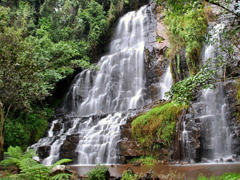
Karera Water Falls in the deep forest of Rutana Province is one of the most popular tourist destinations in Burundi
Achievement of SDGs in TICAD partnership
Burundi's economic foundation was devastated by the long-term civil war, and the country is still facing many challenges, such as famine, poverty, and large-scale refugee repatriation. Burundi joined the East African Community in 2007, intending to strengthen its partnership with other East African nations in order to reduce poverty and stabilize the economy. Burundi's neighboring countries such as Democratic Republic of Congo, Rwanda and Uganda, have all suffered from domestic conflicts and are still facing instability. Burundi's recovery will help bring about stability in the region.
The Seventh Tokyo International Conference on African Development (TICAD7) in August 2019 focused on three pillars: technological innovation and improving business development through technological innovation and private sector engagement, deepening sustainable and resilient society, and strengthening peace and stability. The TICAD partners, consisting of African nations, Japan, international organizations, private sector and civil society, reconfirmed to contribute these focused areas and join hands for Africa's development. To fulfill TICAD's goals and achieve the Sustainable Development Goals (SDGs), JICA will continue to support for the recovery of Burundi and stability in the region.
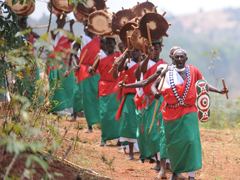
Tambourinaires performing Burundian traditional drums
photo: Ministry of Tourism of Burundi
ABE Initiative participants active back at home
Even though Japanese staff of JICA Burundi Field Office were evacuated to outside the country, JICA has successfully sent about 150 people from Burundi for JICA's training program in Japan or in a third country. They include 10 participants of the African Business Education Initiative for Youths (ABE Initiative).
The ABE Initiative launched in 2014 after the Fifth Tokyo International Conference on African Development (TICAD V). In the years since then, more than 1,200 African youths have studied at graduate schools and experienced internships in Japan. As of November 2019, there are five Burundian ABE participants in Japan studying law, management, and IT.
Ms. Dancille Nizeyimna was a third-batch participant of the ABE Initiative and studied tourism in Japan. Now, she has returned to work at the Ministry of Tourism of Burundi as an advisor, in charge of training tour guides and marketing. She also attends international conferences as a representative of the Ministry. She says, "I hope to contribute for the development of Burundi in the field of tourism."
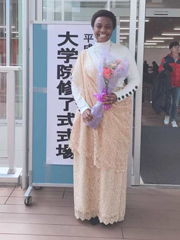
Ms. Dancille Nizeyimna at the graduation ceremony of the graduate school of Kagawa University in Japan
For better health of 500,000 mothers and infants
Civil wars had a serious impact also on the field of healthcare in Burundi. There is a serious shortage in medical facilities and a lack of knowledge among medical staff. In maternal and child healthcare, the rate of pregnant women having prenatal and postnatal check-ups is low, resulting in high mortality rate among mothers and children under five years of age, higher than the average of Sub-Saharan countries. Infants' health check-ups are not adequately provided due to the country's insufficient birth registration system.
In order to improve the quality of maternal and child healthcare and to decrease maternal and infant mortality rates in Burundi, JICA provided various support in one prefecture of the country. They included training for medical staff on obstetrics and neonatal care, improvement of working conditions in hospitals, and a program to promote maternal and child health record books, which also serves as a birth certificate. These efforts were intended to back up the Ministry of Public Health, which hopes to expand these initiatives across the nation.
With recognition gained for these efforts, JICA is now extending the healthcare support to four other prefectures. Schemes are working in partnership with UNICEF: maintenance of medical facilities, procurement of medical equipment, training for medical staff, and distribution of 250,000 copies of maternal and child health record book. It is hoped these schemes will contribute to better health for 500,000 mothers and infants in the area.
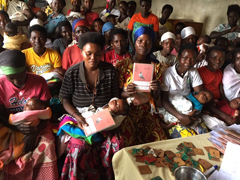
Mothers in Burundi with the mother child health record books
"Boulevard du Japon" eases Bujumbura's traffic congestion
The transportation network in Burundi used to be undeveloped and inadequately maintained. In the capital city of Bujumbura, the roads and public transportation were in limited condition. JICA developed a scheme for the improvement of the transportation in Bujumbura and also provided a total of 86 large, medium, and small-size buses to the city's public transportation corporation. With these buses, many people's means of transportation for their commute to work or school improved. They also helped restore the public transportation system within the capital as well as between major cities and to the neighboring countries.
JICA also maintained Bujumbura's streets. On the main beltway and north-south street, intersections, sidewalks and street lights were installed and the unpaved roads of 4.4 kilometers were paved, resulting in higher safety, less traffic congestion, and transportation cost reduction. The construction was of high quality, with little damage even after 5 years since its completion, and is by far the best of all the public works in Burundi. A part of the maintained road was named "Boulevard du Japon," and is well known among the citizens.
Now JICA is implementing a project for the improvement of the Port of Bujumbura in the hope of strengthening the lake transportation and bringing economic development in Burundi and the region in Lake Tanganyika.
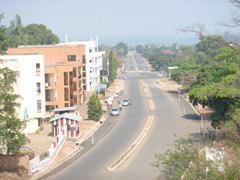
Boulevard du Japon, rehabilitated with JICA's assistance




scroll